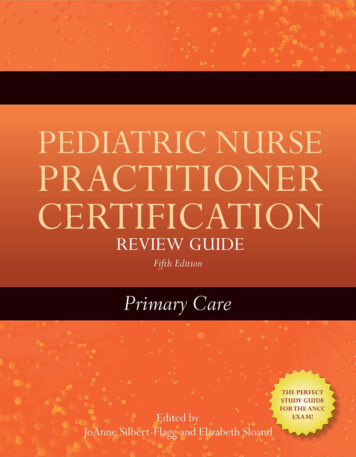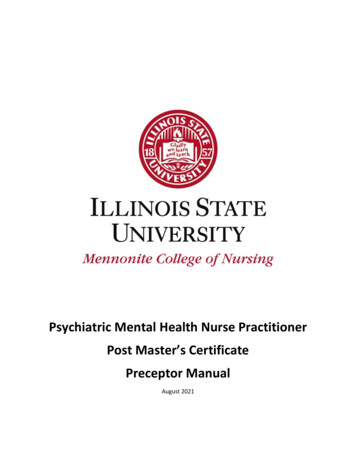
Transcription
Psychiatric Mental Health Nurse PractitionerPost Master’s CertificatePreceptor ManualAugust 2021
Mennonite College of NursingIllinois State UniversityCampus Box 5810Normal, IL 61790-5810Phone: (309) 438-7400Fax: (309) 438-2620
MENNONITE COLLEGE OF NURSINGDear Preceptor,Thank you for agreeing to serve as a preceptor for the Psychiatric Mental Health Nurse Practitioner postmaster’s certificate sequence of our graduate program. Mennonite College of Nursing at Illinois StateUniversity is committed to producing the “preferred graduate” and as such, maintains a strong clinicalcomponent for the program. This strength is based upon the quality of our experienced clinicalpreceptors, as well as that of our curriculum, faculty, and students.This preceptor manual has been developed to provide you with information about the graduatecertificate program and the clinical courses for which you might serve as a preceptor. It also includesguidelines related to your preceptor role. We ask that you read this manual prior to precepting thestudent and to use it whenever a question might arise related the student’s clinical practicum. Weencourage you to contact the course faculty should you have any questions or concerns about theclinical practicum or any student practicing with you. Contact information for course faculty is providedto you in writing at the beginning of each semester in which you are serving as a preceptor.We hope you will find your role as a preceptor both personally and professionally satisfying. And, again,we thank you for your contribution to the education of our future psychiatric mental health nursepractitioners!Sincerely,The FacultyPsychiatric Mental Health Nurse Practitioner sequenceMennonite College of Nursing Graduate ProgramKim Schafer Astroth, PhD, RNDirector, Graduate Programs
Table of ContentsTopicPageMission, Vision and Values4Graduate Programs: Purposes and Outcome Objectives4Psychiatric Mental Health Nurse Practitioner (PMHNP) Sequence: Programof Study5Specialty Clinical Courses: Course Description & Objectives7NUR 422: Advanced Psychiatric Mental Health Nursing Practice I7NUR 423: Advanced Psychiatric Mental Health Nursing Practice II8NUR 424: Advanced Psychiatric Mental Health Nursing Practice III910Policies Related to Preceptors:11Criteria11Role of Preceptors11Legal Liability for the Preceptor11Record of Hours Served as a Preceptor11Expectations of Students & Preceptors12Expectations of Students12Expectations of Preceptors12Clinical Teaching Skills of the Preceptor13Clinical Teaching Skills for the Preceptor: Hints to Help Students Learn14Professional Development of a Nurse Practitioner Student15Clinical Evaluation: A Process and A Goal16
Resources used to develop this manual:Ball State University. Preceptor orientation manual.National Organization of Nurse Practitioner Faculties (2000). Partners in NP education: A preceptormanual for NP programs, faculty, preceptors, & students. Washington, DC: NONPF.“Nurse Practitioner Clinical Preceptor Guide” adapted from The Geriatric Interdisciplinary Team TrainingProgram Nurse Practitioner Clinical Preceptor Guide.Mission StatementMennonite College of Nursing promotes excellence and innovation in education while striving toimprove health locally and globally through exceptionally well-prepared nurses.Vision StatementTo be a community that sets the standard for excellence in nursing practice and education, changing theworld one exceptionally well-prepared nurse at a time.ValuesWe value life-long, curious learners and relationships with one another and our community. We strive toimprove health; demonstrate excellence in our work; provide service to and care for others; and displayempathy, openness, advocacy, and purposeful action, in an environment that welcomes diversity whilepromoting inclusion and the celebration of personal and professional accomplishments.Graduate Program: Purposes and Outcomes ObjectivesThe Master of Science in Nursing degree program offered at Mennonite College of Nursing is designedto prepare nurses to function in selected advanced practice nursing roles, including as family nursepractitioners, psychiatric mental health nurse practitioners, and nursing leaders. The program builds onthe generalist base of a baccalaureate program which focuses on nursing practice with individuals,groups, and community systems.
Purposes Prepare nurses for advanced practice in health care as family nurse practitioners, psychiatricnurse practitioners, and nursing leaders;Prepare graduates to assume leadership roles within the health care system at the regional,state, and national levels;Prepare nurses who can identify researchable problems, participate in conducting research, andpromote the use of research findings in practice; andProvide the foundation for doctoral study.Outcome ObjectivesThe graduate of the master’s degree program will: Demonstrate advanced knowledge and skills in an area of nursing practice;Demonstrate excellence in nursing practice by utilizing the processes of scientific inquiry;Critically evaluate theories and models from nursing and related disciplines for application tonursing practice;Provide leadership which reflects an understanding of the health care delivery system;Demonstrate a commitment to compassionate, professional caring through collaborativeendeavors with clients and other health care providers;Respond to the social, economic, political, ethical, and professional issues affecting nursingpractice; andDemonstrate the ability to communicate a level appropriate for public speaking and professionalwriting.Psychiatric Mental Health Nurse Practitioner (PMHNP) Post-Master’s CertificateThe Psychiatric Mental Health Nurse Practitioner (PMHNP) sequence, a 24 credit-hour post-master’scertificate program, prepares graduates to function in a specialized advanced practice role. Thecertificate program builds on the knowledge and experience acquired by the Family Nurse Practitionerthrough education and clinical practice.The PMHNP applies the nursing process to assess, diagnose, and treat individuals, families, and groupswith acute and chronic psychiatric disorders or the potential for such disorders. The practice of thePMHNP is based on a synthesis of knowledge from the following areas: nursing theory, advancedpathophysiology, pharmacotherapeutics, epidemiology, diagnostic reasoning, advanced healthassessment, research, roles, and legal/ethical issues, as well as content and clinical practica dealing withcare across the lifespan.
The PMHNP utilizes the full scope of therapeutic skills, including psychopharmacology, psychotherapy,and psychoeducation. The role also includes participation in and use of research, development andimplementation of health policy, quality evaluation and improvement, and education of individuals andgroups. The PMHNP works in a variety of settings, such as hospitals, primary care, clinics, schools,telemedicine, public health facilities, private practice, and treatment centers. The role of the PMHNPaddresses the shortage of qualified psychiatric professionals and expands access to mental health care.Graduates are eligible to take the certification examination for Psychiatric-Mental Health NursePractitioners (Lifespan) offered through the American Nurses Credentialing Center (ANCC). The programis fully accredited by the Commission on Collegiate Nursing Education (CCNE).Program of StudyCourse #Course TitleSemesterHoursClinicalHoursNUR 420Psychopharmacology3NUR 421Psychotherapeutics for Advanced PsychiatricMental Health Nursing3NUR 422Advanced Psychiatric Mental Health NursingPractice I7180NUR 423Advanced Psychiatric Mental Health NursingPractice II7180NUR 424Advanced Psychiatric Mental Health NursingPractice III4180TOTAL HOURS24540
Clinical Course Descriptions & ObjectivesNUR 422: Advanced Psychiatric Mental Health Nursing Practice ICourse DescriptionThis course provides an overview of developmental theories, psychological growth and development,neurobiology, and the psychiatric diagnostic reasoning process. Emphasis is on the evaluation andtreatment of common psychopathological disorders in adults.Clinical EmphasisThe practicum includes clinical preceptorship and clinical experience in the role and scope of thePsychiatric Mental Health Nurse Practitioner in various settings, including the opportunity to developcompetence in the provision of psychiatric care to adults in a complex healthcare system.Course ObjectivesAt the successful completion of this course, the student should be able to:1. Provide a supportive, confidential, caring, therapeutic environment in the psychiatric care of clientsacross the lifespan.2. Demonstrate culturally sensitive attitudes and behaviors that facilitate client autonomy andparticipation in the treatment plan.3. Use evidence-based screening and clinical evaluation tools in the assessment of adults withpsychiatric health concerns.
NUR 423: Advanced Psychiatric Mental Health Nursing Practice IICourse DescriptionDidactic and practicum expand on previous content, including evidence-based assessment andtreatment of common pediatric- and geriatric-specific psychiatric disorders. This course provides anoverview of the continuum of psychiatric care, including risk assessment, early intervention, crisismanagement, recovery, and resiliency. Issues relevant to special populations include trauma-informedcare, adverse childhood experiences, stigma, legal and ethical concerns, and health inequity. Emphasis ison the evaluation and treatment of age-specific psychiatric disorders in the pediatric and older adultpopulations.Clinical EmphasisThe practicum includes clinical preceptorships and continuing clinical experience in the role and scope ofthe Psychiatric Mental Health Nurse Practitioner in various settings, including the opportunity todevelop competence in the provision of psychiatric care across the lifespan in a complex healthcaresystem.Course ObjectivesAt the successful completion of this course, the student will be able to:1. Demonstrate appropriate diagnostic reasoning and critical thinking skills related to theidentification, assessment, and treatment of common psychopathologic conditions across thelifespan.2. Provide counseling and guidance to clients and families across the lifespan about expected andpotential changes related to specific psychopathologic conditions and their treatments.3. Manage the care of pediatric, adult, and geriatric clients based on evidence-based clinical practiceguidelines and client goals, preferences, and socioeconomic factors.
NUR 424: Advanced Psychiatric Mental Health Nursing Practice IIICourse DescriptionDidactic and practicum focus on synthesis of advanced knowledge with emphasis on clinicalcompetencies for advanced psychiatric mental health practice. This course provides an overview ofissues surrounding transition to practice for the Psychiatric Mental Health Nurse Practitioner, includingscope of practice, certification and licensure, ethical considerations, and reimbursement.Clinical EmphasisPracticum includes clinical preceptorship and emphasizes the application of advanced psychiatric mentalhealth nursing knowledge and demonstration of the ability to provide comprehensive, evidence-basedpsychiatric care for clients across the lifespan.Course ObjectivesAt the successful completion of this course, the student should be able to:1. Integrate knowledge from specialty psychiatric mental health courses as the basis for the delivery ofevidence-based psychiatric care across the lifespan.2. Demonstrate effective intra- and interprofessional collaboration when providing care for clients ofall ages.3. Perform evidence-based psychiatric examinations and develop a comprehensive problem list andtreatment plan, using both pharmacologic and non-pharmacologic treatment modalities asappropriate.4. Develop therapeutic relationships with clients and families across the lifespan, maintainingconfidentiality, ethical practice, and appropriate professional boundaries.
Policies Related to PreceptorsCriteriaThe following are minimum criteria which must be met by persons serving as main preceptors in clinicalpracticum of the graduate certificate program. The preceptor must: Be nationally certified in an area of advanced practice nursing appropriate to the goals of thegraduate nursing program or be a board eligible/certified physician in an area appropriate to thefocus of the student’s area of study;Hold current licensure for the practice of medicine or advanced practice nursing in the State ofIllinois or in the state in which the student is completing clinical.Possess at least one year of clinical experience following professional education as an advancedpractice nurse or physician;Demonstrate a sincere interest in teaching and mentoring graduate nursing students enrolled inthe clinical practica;Be able to allocate sufficient time and space resources to effectively fulfill the role; andShow willingness to collaborate with graduate nursing faculty and graduate nursing students inplanning and evaluating clinical practicum experiences.Role of PreceptorsPreceptors assist students in the graduate nursing program by: Providing students with opportunities to apply and advance their ability in health assessment,maintenance, and education, and assisting with the care management of selected clients;Demonstrating collaborative physician-advanced practice nurse practice;Serving as a resource for the student at the clinical site;Providing rationale for own practice;Providing validation for assessment findings and clinical decision-making;Assisting with the evaluation of the student and the program.Legal Liability for the Preceptor The preceptor remains liable for the care of the patient.Legal and reimbursement guidelines require that preceptors validate assessment findings reviewlaboratory tests, and confirm differential diagnosis and management plans with students for allpatients they see.Review by the preceptor must be documented in the patient’s record and the preceptor mustco-sign all records in which the student has provided documentation.
Record of Hours Served as a PreceptorWhen you agree to serve as a preceptor, your demographic information is entered into the College’spreceptor database. After the end of the semester, you will receive a letter from the College noting thenumber of clinical hours you precepted. These hours are also recorded in the database. Preceptorshiphours are often useful for recertification purposes for the preceptor.
Expectations of Students & PreceptorsExpectations of StudentsThe student is responsible for: Obtaining preceptor’s written verification of agreeing to serve as a preceptor;Verifying with Mennonite College of Nursing that a clinical contract is in place with the clinicalsite prior to beginning the clinical experience;Contacting the preceptor to arrange a mutually agreeable clinical schedule;Developing personal learning objectives and sharing these with the preceptor;Observing policies of the agency, including dress code;Adhering to all HIPAA requirementsNotifying the preceptor of illness/absence and arranging to make up missed clinical time;Conferring with the preceptor to keep informed of progress;Conferring with the preceptor/faculty when the experience is not meeting the learningobjectives;Completing and discussing with the preceptor a self-evaluation of clinical performance/abilities;Adhering to the standards and scope of professional practice.Expectations of PreceptorsThe preceptor is expected to: Provide Mennonite College of Nursing with requested information, such as that related to thepreceptor’s licensure, practice, and education;Read this manual and review the information for the course in which the student is currentlyinvolved;Orient the student to the clinical site and applicable agency policies;Facilitate an informal, collaborative, and mutually respectful environment in which to learn;Be an expert role model;Provide valuable and evidence-based learning experiences with appropriate client populations;Allow and encourage “hands-on” assessment and care of clients in the clinical setting;Provide ongoing feedback to improve the student’s assessment and management skills;Guide the student to pace the learning experience to meet client population and clinical siteneeds and student learning needs;Direct the student to resources, such as treatment guidelines;Notify faculty of any concerns about student behavior, clinical skills, and/or student progression,and provide written anecdotal documentation as appropriate;Complete and review with the student a final written evaluation of performance which is thenmaintained in student’s file at Mennonite College of Nursing.
Clinical Teaching Skills of the PreceptorTips for Maximizing Student Learning Experiences Students learn best by actually participating in client care, not by simply observing. Thepreceptor needs to allow the student to provide “hands-on” care as much as possible withconsideration for clients’ preferences. Students may question a preceptor’s care which differs from textbook guidelines. Thepreceptor may modify care guidelines based on experience as a health care provider and basedon the unique client situation. It is helpful to discuss such modifications with the student andthe rationale for such changes. Students should not be expected to see every client seen by the preceptor. Students needtime to practice history-taking and assessment skills, to develop differential diagnoses,determine a plan of care, and document the client visit. Students should advance in the numberof clients they see as they progress through the program, however, preceptors need to realizethat even the student nearing the end of the program will not be able to, nor should they beexpected to, carry the full patient load of an experienced preceptor.oHere is an example of how a student’s learning needs and the preceptor’s need formaintaining efficiency can both be met:8:00-8:20 amStudent observes patient 1 with preceptor8:20-8:40 amStudent assesses patient 2 with preceptor8:40-9:00 amStudent charts on patient 2 while preceptor sees patient 39:00-9:20 amStudent observes patient 4 with preceptor9:20-9:40 amStudent assesses patient 5 with preceptor9:40-10:00amStudent charts on patient 5 while preceptor sees patient 6 Students need the opportunity to improve based on preceptor feedback. Students benefitfrom critique of their performance throughout the clinical experience, not simply at the end ofthe experience. This allows the student the opportunity to continually improve in skills and helpsto establish a supportive student-preceptor relationship. Students view preceptors as role models for clinical skills. Students benefit from initiallyobserving the preceptor’s abilities in interviewing, assessment, critical thinking, communication,and patient and family education.
Clinical Teaching Skills for the Preceptor: Hints to Help Students LearnAdvanced practice nurses and physicians may be novices in terms of serving as preceptors. Likewise,veteran preceptors may benefit from teaching hints. The following is provided to guide the preceptor inassisting the student to think critically and grow throughout the clinical experience.Clinical Teaching SkillWhat the Preceptor Might SayAgree on the central clinical issue“What do you think is going on?”Get the student’s opinion of the central issue“I agree .”“Have you considered .?”Ask targeted questions to define the student’slearning needs“What led you to that conclusion?”“What part of the comprehensive assessmentis most important in this situation?”“Is the patient’s primary concern the same asyours?”Teach general clinical rules“When this happens, you need to consider ”Reinforce the principles of care wheneverpossible and discuss modifications whenappropriate.“The standard guidelines for treatmentinclude .”“The typical treatment for this problem is notappropriate for this patient because .”Positively reinforce good clinical skills andappropriate professional behavior.“You were thorough in your collection of thepatient’s history.”Review what needs to be improved. Correctmistakes.“I noticed you did not assess for history ofmanic symptoms. Why is it important toinclude this when a patient presents withdepression?”Promote critical thinking skills.“The patient reported urinary frequency.Given her current psychotropic medications,what do we need to be concerned about?”
Professional Development of a Nurse Practitioner StudentIt is expected that the student will grow in ability and confidence as the student progresses through thethree sequential clinical courses. Students may vary somewhat in this progression based on their pastclinical experiences. For example, a student whose past nursing experience was focused in an inpatientmedical-surgical setting may feel unskilled in an outpatient psychiatric clinical site. Likewise, a studentwho is very comfortable in a psychiatric setting may do very well immediately in the first clinical course.Following are some general descriptions of students at various points in the clinical sequence.The Beginning Student (enrolled in NUR 422 PMHNP I) Student spends initial time observing preceptor.Student assessment skills should be validated by the preceptor.Student management plans need significant guidance.Student needs high level of direction, which decreases as skill level increases.As student progresses, preceptor allows student to take on more independent responsibilities.The Intermediate Student (enrolled in NUR 423 PMHNP II) Student becomes more proficient in analyzing data, is more skilled with assessing andformulating management plans.Student improves in use of time and resources.Student may require assistance in prioritizing and coordinating care.Student requires support and assistance for complex cases.Student is ready to demonstrate other nurse practitioner functions such as patient/familyteaching and participating in teams.The Advanced Student (enrolled in NUR 424 PMHNP III) Student is expected to perform all role functions in an organized, efficient, skillful, andindependent manner.Student is expected to engage in interdisciplinary role collaboration, consultation, and referral.Student and preceptor develop a more collegial relationship.(Above from “Nurse Practitioner Clinical Preceptor Guide” adapted from The Geriatric InterdisciplinaryTeam Training Program Nurse Practitioner Clinical Preceptor Guide)
Clinical Evaluation: A Process and A GoalEvaluation should be a collaborative effort between the student and the preceptor. The student shoulddevelop and use personal learning objectives to discuss learning needs with the preceptor. Thepreceptor likewise can use these objectives, along with course objectives, professional standards/scopeof practice, and standards of care to provide the student with constructive evaluative feedback.Formative EvaluationInformal evaluation should occur throughout the clinical experience with the preceptor. This gives thestudent the opportunity to use the feedback in a positive manner in order to improve on performance. Feedback is best provided as soon as possible with consideration of patient needs being metfirst.The feedback should also be provided in privacy to avoid embarrassing the student in front ofpatients or staff.The preceptor should be descriptive in the feedback and help the student to analyze the causeof the problem and what might be done to avoid the problem in the future.The preceptor should also elicit feedback from the student as to how the preceptor mightimprove in providing feedback to the student.Summative EvaluationAt the end of the clinical experience, the preceptor is asked to provide a written summary of thestudent’s performance on a standard form. The preceptor and student should review this evaluationtogether at the end of the clinical experience. If formative evaluation has occurred throughout theclinical experience and open communication between the preceptor and student has been maintained,the content of the summative evaluation should not be a surprise for the student.
addresses the shortage of qualified psychiatric professionals and expands access to mental health care. Graduates are eligible to take the certification examination for Psychiatric-Mental Health Nurse Practitioners (Lifespan) offered through the

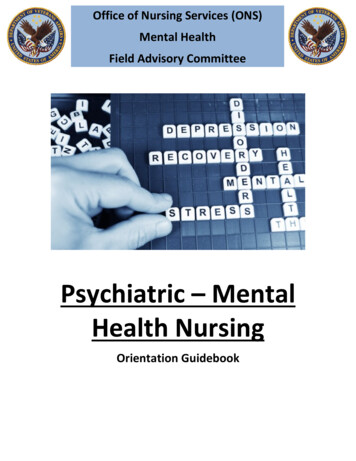
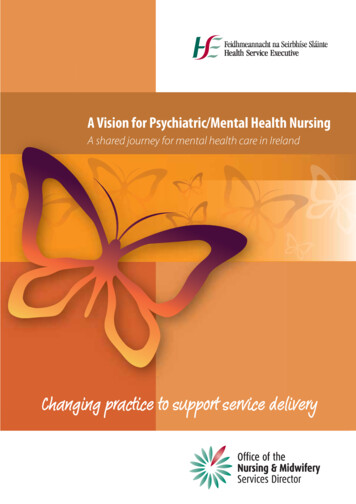
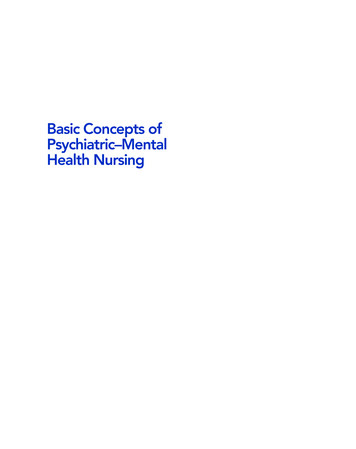
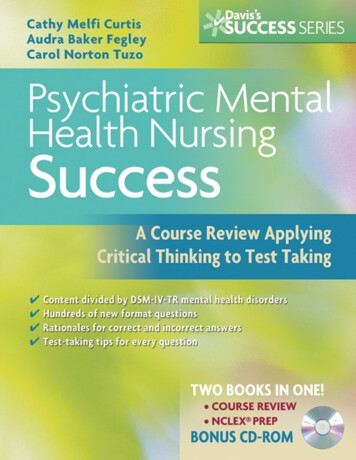
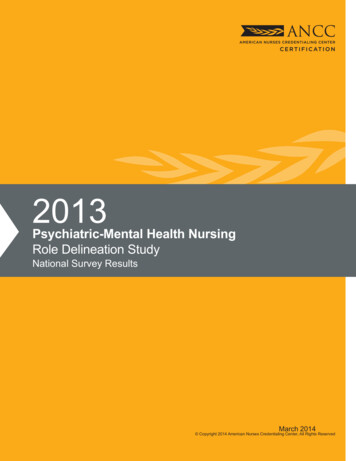
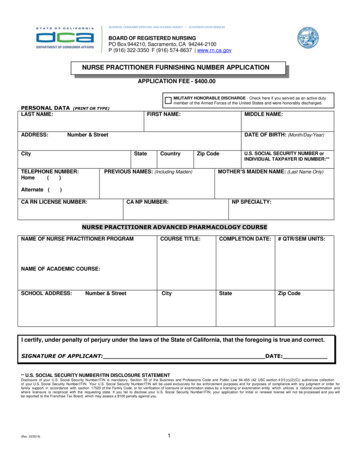
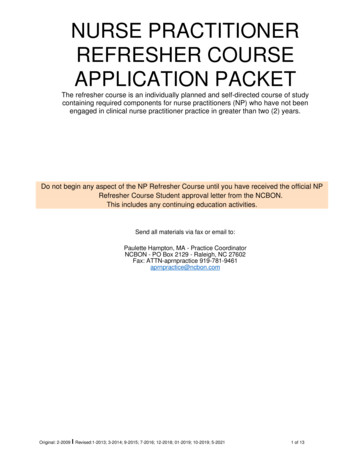
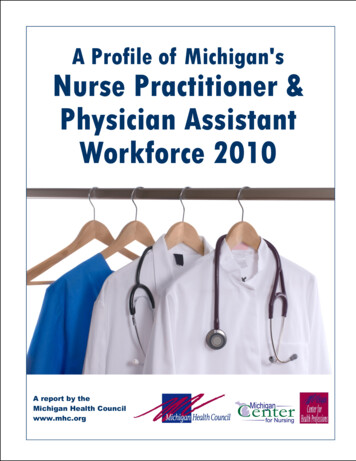
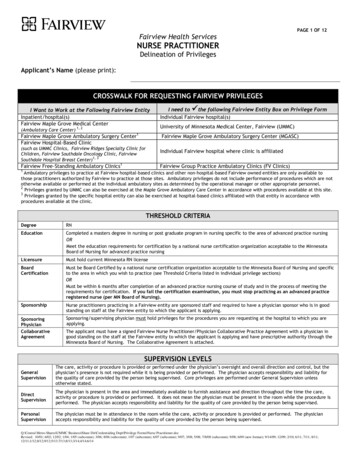
![Home Nurse Practitioner Program [Read-Only]](/img/11/smith-home-nurse-practitioner-program.jpg)
